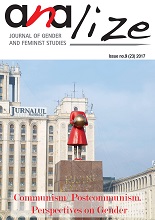Women and Work in the Civil Society Sector: The Case of Romania and Poland
Women and Work in the Civil Society Sector: The Case of Romania and Poland
Author(s): Andrada NimuSubject(s): Gender Studies, Civil Society, Sociology of Politics
Published by: Societatea de Analize Feministe AnA
Keywords: women’s leadership; civil society organizations; NGOs in Romania; NGOs in Poland;
Summary/Abstract: This article analyses the roles of women leading women rights nongovernmental organizations (NGO) in Romania and Poland. In the twenty-seven years that passed since the fall of communism, both countries have benefited from many improvements concerning the status of women. Yet, both countries experienced a “fast-line” feminism, in which generations, ideologies and institutions that have been developed for long periods of time in the West had to be fast-forwarded in post-socialism (Grabowska 2009). Within this context, how did women’s leadership roles evolve in the civil society sector in two Central and Eastern European countries? How are women working in non-governmental organizations affected by flexible programs, fluctuations in wages, shifts of personnel and demands of funders? In order to offer some insights on these issues, in the first part of the article I explain how contextual elements determined women’s effectiveness as leaders. To substantiate the findings, in the second part I focus on women’s experiences inside civil society organizations (CSOs), the difficulties and lessons learned, the internal dynamics, roles and strategies that they employ both in their relations with states and with funders. I focus on the micro level of the organizational cultures, how work inside CSOs differs from other types of work due to activities, relations, time spent and wages and highlight the diversity of women’s organizations and roles. The dynamics of these processes are captured by a two year comparative analysis, through a collection of 30 interviews in Romania and Poland. The findings highlight the particularities of women’s leadership roles, mechanisms and tactics in creating a fairer workplace culture through participatory decision-making, which in turn stimulates employees; and develop negotiating, resisting and decoupling strategies with state representatives and funders to maintain their autonomy, voice and strengths, at the intersection of local context and international normativity, in their quest for gender equality.
Journal: AnALize: Revista de studii feministe
- Issue Year: 2017
- Issue No: 9 (23)
- Page Range: 49-69
- Page Count: 21
- Language: English

